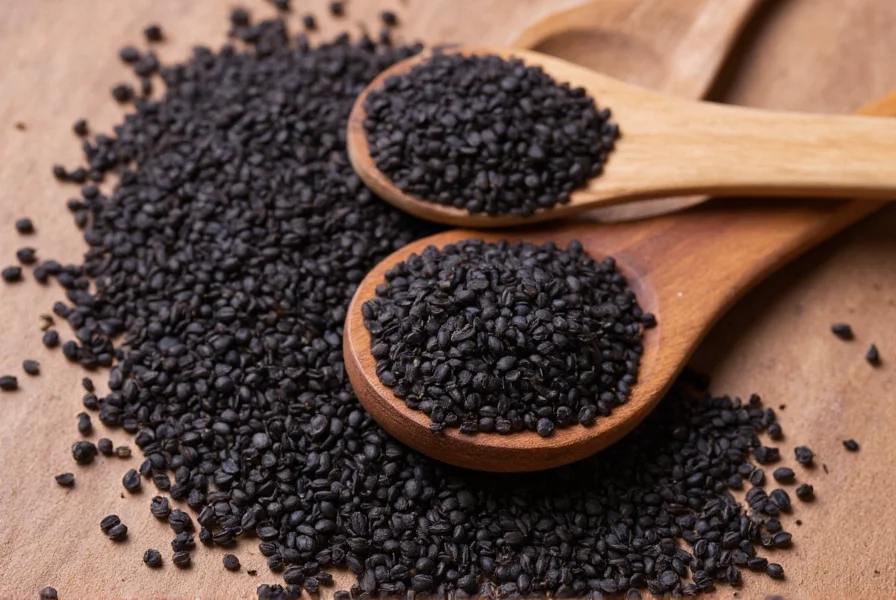These tiny black seeds pack a remarkable nutritional profile while serving as a versatile kitchen staple. Understanding their proper usage, storage, and evidence-based benefits can help you incorporate them effectively into your diet and wellness routine.
What Exactly Are Black Seeds?
Black seeds (Nigella sativa) originate from an annual flowering plant native to Eastern Europe, the Middle East, and Western Asia. Despite common names like "black cumin" or "black caraway," they're botanically unrelated to true cumin (Cuminum cyminum). The plant produces delicate pale purple or blue flowers that develop into seed pods containing numerous small, matte black seeds.
The seeds measure approximately 2-3mm in length with a curved, angular shape and distinctive matte black appearance. When crushed, they release a complex aroma combining notes of oregano, onion, and pepper. This unique flavor profile explains their widespread use across diverse culinary traditions.
Nutritional Composition of Black Seeds
Black seeds contain numerous beneficial compounds that contribute to their nutritional value. The most researched component is thymoquinone, which accounts for approximately 30-45% of the seed's essential oil content. They also provide significant amounts of:
| Nutrient | Amount per 100g | Key Benefits |
|---|---|---|
| Thymoquinone | 0.5-1.5g | Antioxidant and anti-inflammatory properties |
| Dietary Fiber | 10.3g | Digestive health support |
| Protein | 20.5g | Essential amino acids |
| Healthy Fats | 35.7g | Omega-3 and omega-6 fatty acids |
| Calcium | 448mg | Bone health support |
| Iron | 66.3mg | Blood health and oxygen transport |
Culinary Applications of Black Seeds
Chefs and home cooks value black seeds for their distinctive flavor that enhances both savory and sweet dishes. Unlike many spices, black seeds develop their full flavor when heated, making them ideal for tempering in hot oil at the beginning of cooking.
In Indian cuisine, kalonji features prominently in:
- Breads like naan and paratha
- Curry bases and vegetable dishes
- Chutneys and pickles
- Spice blends including panch phoron
Middle Eastern preparations often use black seeds in:
- Hummus and baba ganoush
- Flatbreads and crackers
- Salad dressings and marinades
- Yogurt-based dips
For best results when using black seeds in cooking, toast them lightly in a dry pan until fragrant before grinding or adding to dishes. This process enhances their complex flavor profile while preserving their nutritional compounds.

Proper Storage Techniques for Maximum Freshness
Preserving the quality of black seeds requires appropriate storage methods. Exposure to light, heat, and moisture significantly reduces their shelf life and degrades beneficial compounds like thymoquinone.
Follow these storage methods for black seeds to maintain freshness:
- Store in airtight glass containers away from direct sunlight
- Keep in a cool, dark pantry location (below 70°F/21°C)
- Refrigerate for long-term storage (up to 2 years)
- Avoid plastic containers which can absorb flavors and oils
- Check periodically for moisture or mold development
Whole seeds maintain their quality significantly longer than ground seeds. For optimal flavor and nutritional value, purchase whole black seeds and grind them as needed using a spice grinder or mortar and pestle.
Evidence-Based Health Considerations
Research into the health benefits of black seeds has expanded considerably in recent decades. Scientific studies have investigated their potential effects on various aspects of health, though more human clinical trials are needed to confirm many findings.
Current research suggests black seeds may support:
- Healthy inflammatory responses through thymoquinone activity
- Normal blood sugar metabolism in preliminary studies
- Respiratory health support, particularly for seasonal challenges
- Healthy skin appearance when applied topically
- Normal cholesterol levels within a balanced diet
It's important to note that while traditional medicine systems have used black seeds for centuries, modern scientific validation varies across applications. Black seeds should complement—not replace—conventional medical care. Consult healthcare providers before using black seeds for specific health concerns, especially if taking medications or managing health conditions.

Black Seed Oil vs. Whole Seeds: Understanding the Differences
Many consumers wonder about the differences between black seed oil vs whole black seeds. Both forms offer benefits but serve different purposes:
- Whole seeds provide dietary fiber and require digestion to release compounds
- Ground seeds offer increased bioavailability of certain compounds
- Cold-pressed oil concentrates lipophilic compounds like thymoquinone
- Supplemental forms provide standardized doses of active ingredients
For culinary applications, whole or freshly ground seeds deliver superior flavor. For targeted applications, black seed oil may provide more concentrated benefits. When selecting products, look for cold-pressed, organic options stored in dark glass containers to preserve quality.
Frequently Asked Questions
What's the difference between black seeds and black sesame seeds?
Black seeds (Nigella sativa) and black sesame seeds come from completely different plant families. Black seeds are smaller, matte black, and have a more pungent, peppery flavor, while black sesame seeds are slightly larger, shinier, and have a nuttier taste. They also differ significantly in nutritional composition and traditional uses.
How much black seed should I consume daily?
Most traditional preparations use 1-2 teaspoons of whole or ground black seeds daily. Clinical studies have used doses ranging from 1-3 grams of black seed powder or 1-2.5 mL of black seed oil. Start with smaller amounts to assess tolerance, and consult a healthcare provider for personalized recommendations.
Can black seeds help with hair growth?
Some traditional practices use black seed oil topically for scalp health. Preliminary research suggests compounds in black seeds may support healthy hair follicles, but robust clinical evidence for hair growth specifically is limited. Many users report improved scalp condition and hair appearance when applying diluted black seed oil regularly.
Are there any side effects of consuming black seeds?
Black seeds are generally safe when consumed in culinary amounts. Some people may experience mild digestive upset when first introducing them. High medicinal doses may interact with certain medications, particularly those affecting blood sugar or blood pressure. Pregnant women should consult healthcare providers before using black seeds medicinally.
How do I incorporate black seeds into my daily routine?
Sprinkle 1/2-1 teaspoon of freshly ground black seeds on salads, yogurt, or roasted vegetables. Add to bread dough or flatbreads before baking. Stir into hummus or salad dressings. For traditional preparation, mix 1 teaspoon of black seed powder with honey and warm water. Remember that heating enhances their flavor and may increase bioavailability of certain compounds.










 浙公网安备
33010002000092号
浙公网安备
33010002000092号 浙B2-20120091-4
浙B2-20120091-4